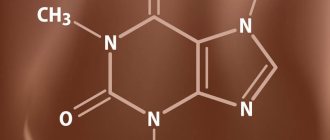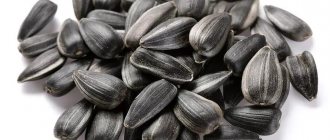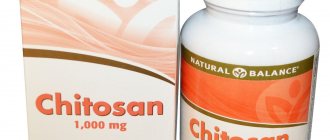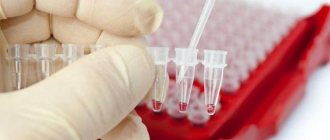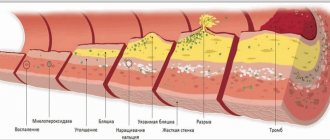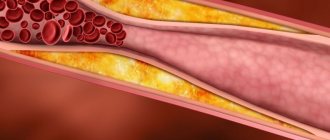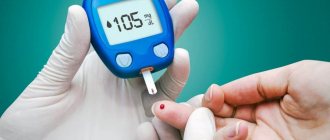Today, there are a huge number of coffee lovers, many of whom simply cannot imagine a day without this invigorating hot drink. However, in addition to the benefits and excellent taste, coffee has a rather negative effect.
Scientists have been studying the effects of coffee on the body and, in particular, on blood cholesterol levels for several centuries.
We have collected and analyzed a lot of relevant information about scientific research and medical practice, so this article is intended to determine as clearly as possible what effect the consumption of coffee beans has on cholesterol and in what doses it is still allowed to drink coffee with elevated blood cholesterol levels.
Composition of the product and its effect on the body
Despite the simplicity of the drink and its low calorie content (about 9 Kcal in one cup), the coffee beans themselves are not as simple as they might seem at first glance, but have an extremely complex and varied composition.
Safe dose of coffee.
Caffeine , the same main component found not only in coffee but also in tea, is extracted industrially for further use in energy drinks.
Caffeine affects the central nervous system, increasing its activity, as a result of which mental and physical performance increases, drowsiness disappears, and dopamine (the hormone that causes a feeling of pleasure) is released.
In addition, new studies using high-tech equipment have shown that caffeine reduces platelet aggregation, that is, it reduces the risk of small particles sticking together, which subsequently form blood clots.
However, there is also a negative side to this effect, since caffeine increases heart function and increases blood pressure. This is why doctors do not recommend drinking coffee if you have atherosclerosis, hypertension and other diseases of the cardiovascular system.
Nicotinic acid (vitamin B3) is a vitamin involved in many metabolic reactions, including lipid metabolism. One cup of natural bean coffee (100 ml espresso) contains from 1.00 to 1.67 mg of nicotinic acid.
It is known that when taking more than 3-4 mg of nicotinic acid per day, the level of LDL cholesterol in a person’s blood significantly decreases, and the level of HDL (the so-called “good cholesterol”) increases.
Nicotinic acid contains vitamin PP - one of the main vitamins that determine the processes of conversion of energy, fat and sugar. In addition, it strengthens small capillaries, normalizes the structure and elasticity of blood vessels, and improves blood circulation.
Nicotinic acid also dilates small blood vessels, improving the circulation of substances in them, and increases the fibrinolytic activity of the blood. Due to such a wide range of pharmacological properties, nicotinic acid is actively used in the treatment of atherosclerosis and some other vascular diseases.
However, this does not mean at all that if you have high cholesterol levels, it is enough to drink several cups of coffee a day, which provide a “medicinal” dose of nicotinic acid. Don’t forget about the high content of the previous component in coffee beans – caffeine.
Cafestol is a molecule found in unfiltered Arabica beans (it is found in extremely small quantities in filtered drinks). As a rule, cafestol is formed mostly during cooking. Its structure is similar to resin, it is insoluble in water, and when it enters the body, it disrupts lipid metabolism, changes the activity of liver cells, as well as the synthesis of bile acids.
In addition to these three components that are most interesting to us, coffee beans also contain:
The effect of an excessive dose of caffeine on the body.
nitrogenous substances;- fats;
- proteins;
- carbohydrates;
- essential oils;
- sugar;
- vitamin B6.
The content of all the substances described above depends on the type of coffee beans, as well as on the roasting method and the subtleties of preparation. However, their effect on the body with an adequate daily dose of the drink remains minimal; caffeine, cafestol and nicotinic acid have the greatest impact.
Cholesterol is not the enemy. So why is it needed?
Cholesterol (or cholesterol) is an organic substance that is found in the cells of humans and animals from birth. It belongs to vital lipids, is actively synthesized in the body and cannot be replaced by anything else, since it performs a whole list of useful functions.
What does cholesterol affect?
- strengthens cell walls, participates in the transport of substances into the cell and back,
- participates in the digestion process,
- participates in the formation of corticosteroid and sex hormones,
- stimulates the production of vitamin D and bile acid,
- protects and strengthens nerve fibers.
Then why is it most often mentioned in a negative sense and in the company of terrible diseases? The fact is that during processing in the body, cholesterol can become “bad”. Let's figure out what doctors mean by this term.
Does coffee raise cholesterol?
On the one hand, if we consider the drink from the point of view of its chemical composition, then the answer to the question of whether coffee increases cholesterol is clear, since coffee does not contain any vegetable fats or cholesterol.
However, it is much more objective to consider a product from the point of view of the impact of its components on the body. Almost any coffee, especially unfiltered coffee made from Arabica varieties, contains cafestol, which directly increases cholesterol levels by an average of 8-9% after just a few weeks of regular consumption of the drink.
Undoubtedly, for a healthy person with normal blood cholesterol levels, this does not pose any health threat. However, for a person with impaired lipid metabolism and a high risk of developing atherosclerosis, such changes can be critical.
When it enters the stomach, cafestol irritates the receptors of its epithelium, as a result of which, after a complex biochemical reaction, increased production of cholesterol by liver cells is stimulated. In addition, cafestol can accumulate in the human body and have even more harmful effects over time. So, with its regular use, after a year, cholesterol levels can increase by 12-20%, and if its level is already quite high, an additional increase in concentration by 20% will be simply critical.
What does cholesterol look like?
Many people think of cholesterol as fat and believe that the fattier the food, the more cholesterol it contains. This point of view is only partly justified. Cholesterol is found in the blood and looks like a viscous substance. Cholesterol cannot be considered exclusively harmful, because it is consumed by the body in the process of producing hormones and forming cell membranes. To varying degrees, cholesterol is involved in the functioning of the immune, nervous and digestive systems, so a certain amount of cholesterol must be contained in the body at all times. Another thing is that keeping it within acceptable limits is not always easy.
Excess cholesterol
tends to deposit on the inner walls of arteries.
At first, this is an imperceptible process, but gradually, due to the cholesterol layer, the diameter of the artery narrows, and blood begins to pass through it worse. In places where the vessel narrows, a dense formation is formed from the cholesterol layer, which is commonly called a “ cholesterol plaque
.”
Cholesterol plaques not only almost completely block the flow of blood through the vessel, but also reduce its elasticity. The process of cholesterol formation is called “ atherosclerosis
”.
By themselves, single cholesterol plaques do not pose a serious health hazard, but if you do not take action, over time there will be too many of them. In addition, cholesterol plaque
- This is the initial stage of
thrombus
. Often blood clots form where atherosclerotic plaques were located. The danger of a blood clot is that it completely seals the vessels and can block the flow of blood to vital organs. If a blood clot occurs in a vessel supplying the heart, a person may have a myocardial infarction, and if blood flow stops in a vessel supplying the brain, the person may suffer a stroke.
Does high cholesterol cause death?
Cholesterol itself is not considered deadly. Complications caused by high cholesterol levels can lead to death. We have already named some of them. Atherosclerosis can trigger the development of coronary heart disease, and one of the complications can be myocardial infarction, stroke, acute thrombosis and other diseases. The list can be large and is determined by which arteries were affected.
So is it possible to drink coffee if you have high cholesterol?
In general, due to the cafestol content, doctors do not recommend drinking coffee if you have high cholesterol. However, with a competent approach, which involves preparing a drink with minimal cafestol formation, you can still treat yourself to a cup of aromatic drink. There are two methods of circumventing the ban, in which the influence of cafestol is absolutely safe:
After brewing coffee, it must be passed through a fine filter, such as a disposable paper filter. This way, all insoluble components, including cafestol, will remain on the filter. When preparing coffee in a coffee machine, you must pay attention to the presence of a filter in it; if there is none, you can pass the drink through the same paper filter after preparing it in the coffee machine.- Since more than 95% of cafestol is formed during brewing, it is possible to drink instant coffee that does not undergo this process. However, in this case, everything depends on the quality of the product, because cheap instant coffee intended for wide consumption does not always comply with safe processing and packaging technology.
But even with such methods, it is not recommended to abuse the drink and drink more than two cups per day. In addition, do not forget about the high caffeine content, which creates additional stress on the heart and increases blood pressure, which is highly undesirable if you have high cholesterol.
There is a myth that adding milk to coffee neutralizes cafestol and subsequently this composition has absolutely no effect on the concentration of cholesterol in the blood.
In fact, this is not true and milk has no effect on cafestol. In addition, adding milk with a fat content of more than 2% makes coffee even more dangerous, since milk contains a lot of animal fats, which are simply unacceptable for people suffering from hypercholesterolemia.
Conclusion: natural bean coffee, considered classic, is simply prohibited if you have high cholesterol, because, despite many positive qualities and a high content of vitamins, it contains caffeine and cafestol. If for a healthy person they do not have a significant effect, then for a person with high cholesterol levels they will only aggravate the situation. The only exception is filtering the drink through a paper filter.
The way out of the situation is instant coffee, which does not go through the brewing process and dissolves in ordinary warm water. However, even in this case, it is necessary to monitor the strength of the drink and how many cups of coffee you drink during the day.
Why cholesterol is called the silent killer
A person cannot always tell that cholesterol is high by external signs. Therefore, the problem remains unattended for a long time, and the situation continues to worsen. Most often, symptoms of concomitant diseases manifest themselves. Often, increased cholesterol is detected only after a heart attack. This is why cholesterol is called the silent killer.
Finding any of the following symptoms is a good reason to donate blood and check your cholesterol levels. The sooner you do an analysis to determine your lipid balance, the greater your chances of defeating the disease.
Symptoms of high cholesterol:
·
- premature hair loss in men,
- menstrual irregularities in women,
- the appearance on the skin (most often near the eyes) of xanthoma - yellowish spots and tubercles,
- angina pectoris and pressing pain in the heart area,
- pain and discomfort in the legs when walking and exercising,
- ruptures of blood vessels, problems with veins.
This is why doctors recommend regular tests for prevention: 1–2 times a year, depending on age and the presence of risk factors.
Modern decaffeinated drink
Another safest loophole for drink connoisseurs is decaffeinated coffee, invented in 1903. As coffee beans are processed, decaffeination is carried out - the process of removing caffeine through steam, boiling water, saline and many other methods. In any case, up to 99% of caffeine can be removed from the beans.
Decaffeinated coffee has the following benefits:
- No effect on blood pressure and even vice versa - such a drink lowers it;
- Lack of effect of stimulating the heart in increased activity mode;
- This drink does not affect sleep at all, so you can safely drink it even in the evening.
The negative side of this treatment is the complete loss of the stimulating and energetic properties that make many people so fond of drinking coffee in the morning. In such a drink, only the taste characteristics remain, but vitamins remain, as well as nicotinic acid, which has a positive effect on lipid metabolism.
Causes of high cholesterol
High cholesterol is usually associated with an excess of animal fats in the diet. Fried meat, sausages, smoked meats, fatty dairy products, French fries, chips and other unhealthy foods - this is not a complete list of the main enemies of all those who strive to maintain normal cholesterol. However, the situation is somewhat more complicated.
The fact is that a person receives about 20–30% of total cholesterol from food, the rest is synthesized in cells (mainly in the liver). In addition, all cholesterol in foods can be considered neutral. But whether it becomes good or bad depends on how many high- or low-density lipoproteins are in the human body. Their quality is influenced by the coordinated work of the whole organism.
Endocrine diseases, metabolic disorders, liver, intestinal and adrenal diseases are the main causes of LDL and, as a result, high cholesterol. And fast food and fatty foods further aggravate the situation. Failures in the operation of the above systems are most often caused by an incorrect lifestyle. In more rare cases, pathologies can be hereditary.
Hereditary causes of high cholesterol (manifest at an early age):
- low estrogen levels in women,
- atherosclerosis and ischemic disease in close relatives,
- arterial hypertension.
Acquired causes of high cholesterol:
- sedentary lifestyle,
- overweight and obesity, diabetes mellitus,
- overeating and an abundance of unhealthy fatty foods in the diet,
- smoking, alcohol abuse,
- frequent stressful situations,
- taking hormonal medications,
- deficiency of vitamin D and omega-3 polyunsaturated fatty acids,
- gastrointestinal diseases,
- kidney dysfunction.
Cholesterol also increases with age. In men, signs of high cholesterol tend to appear earlier – after 35–40 years. Women 50+, having entered menopause, also often become susceptible to this pathology. Since an imbalance of good and bad cholesterol occurs unnoticed by a person, doctors recommend regular testing and monitoring of cholesterol levels. Men should do this after 40 years of age, women after 50 years of age, regardless of their health.
What to do and eat to lower cholesterol
Depending on how much the indicators exceed the norm and whether there are other negative factors, various methods are used: a special diet, physical therapy, giving up bad habits, lifestyle changes, drug treatment. This should be done after all the tests have been completed, the ratio of bad and good cholesterol has been determined, and a diagnosis has been carried out. If the disturbances are caused, for example, by a malfunction of the endocrine system, then complex medications cannot be avoided.
Only a general practitioner or cardiologist can prescribe treatment. In difficult cases, specialized specialists – lipidologists – will be involved. To lower cholesterol, your doctor may prescribe statins. However, these substances do not act selectively: they simultaneously reduce the level of both LDL and HDL, and negatively affect liver function, and therefore they must be handled with extreme caution. Self-prescription of statins and self-medication is dangerous to health and life.
To prevent high cholesterol:
- Follow your diet. Eat more fiber, fresh vegetables and fruits. Eliminate foods that contain trans fats, fast food and fried foods from your diet. Correcting your diet can reduce cholesterol by 10–15%.
- Take vitamins and dietary supplements. Omega-3 fatty acids and vitamin D are useful for normalizing cholesterol.
- Do a comprehensive diagnosis of the health of the body. Normalize hormonal levels, cure endocrine diseases, if any. Monitor your blood sugar regularly.
- Change your lifestyle. Give up bad habits or reduce them to a minimum, walk more. Monitor your sleep schedule: try to go to bed before 23:00 and get enough sleep.
- Move. Start with half-hour walks at a brisk pace, gradually increasing the walking time. Take up dancing or join a swimming pool: people who lead an active lifestyle increase their HDL levels. Do not neglect exercises and simple physical exercises: bending, turning the body, squats. Do short stretches several times throughout the day.
Why does someone who sits a lot age faster and what else is dangerous about a sedentary lifestyle >>
And remember the main thing: most diseases are much easier to cure at the initial stage, when practically nothing bothers the person. But complications caused by high cholesterol will remain for life. Therefore, it is so important to undergo a medical examination on time, take tests and lead a healthy lifestyle.
